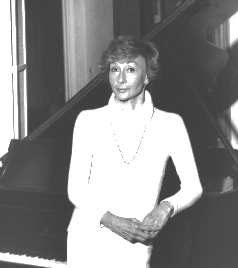Page 15
Taylor: I saw him maybe once. That's all. In recent times, within the past fifteen years, I saw him once. He must be dead by now. The person to whom he was married at that time sent me a picture of him at his ninetieth birthday, and this was some time back.
Biagi: So you've seen him once since then, or you saw him once when you were a young girl?
Taylor: Once when I was a young girl and I've seen him once in this recent time. The recent time came about because from time to time, people would say, "Oh, I know your brothers," which always kind of shocked me, because I didn't grow up with my half-brothers. But when I became visible, of course, I had been on the radio a lot, but I don't think they ever listened to the radio. But when I became pretty visible on television, is when I began to hear from people who said, "I saw your brothers," and the family began to identify with me and send me invitations and call me up. This one brother made a point of trying to drop by, and I went out to visit them once. The kids wanted me to help them with things.
For a moment it seemed like a nice thing to have my family, or an extended family, the family I would have had if I had been with them all the time. But then it just didn't take hold in myself, and I couldn't embrace that family at all, and didn't. It just seemed to me that they were remote and the way that they surfaced when I became visible didn't seem to me to, therefore, spring from a deep love that they'd always cherished, you know, of their dear little sister. So I just didn't go back to see them anymore. My kids have been a little unhappy about that, but not really. When they've thought about it at that time, they thought, "Ah, gee, Mom, we should know these other folks," because that's the way everybody does. But we didn't.
Biagi: Talk about being a teenager and hanging out at Sis'. I know there were a lot of people who visited there and whom you got to know through that restaurant. Do you remember some of those experiences?
Taylor: The governor of Massachusetts, Governor Saltonstall, came by, but he came by because his daughter was at Scripps and I brought her home to my house for a Thanksgiving or a holiday, and then he came by to visit my mother, he and his wife, one time when they were out here. Of course, it was an experience for his daughter to come to my little place. I think the Saltonstalls were probably a highly placed family in Massachusetts before he became a governor. It was quite different for Emily, who was a lovely girl, very, very quiet, and a true ugly duckling. When she came down with me, though, she consented to have a permanent and do all these things that were just totally different for Emily. Anyway, the governor came along.
Clark Gable came by one time. My mom just loved Clark Gable. I can't remember when he came, and I wasn't there. Of course, the legend of Mother's place particularly revolves around the fact that a good many of the oil people who came there were in the formative stages of a lot of the major oil companies and were important in the industry and did concoct a lot of deals. That was a very big part of Long Beach developing. The whole arrangement was that money from the tidelands oil went to Long Beach and had to be used within a certain distance back from the shoreline. Of course, those oil men were part of all of these original wheelings and dealings that brought all that about.
They were the same guys, the same people, whose companies developed and grew and became very important. But they were the people who used to come to my mother's place. It was the place in Signal Hill to go. Though it was unpretentious, it was good food, a lot of fun kidding with Sis, see all the guys, hang around. They had some pinball machines and a few things like that.

